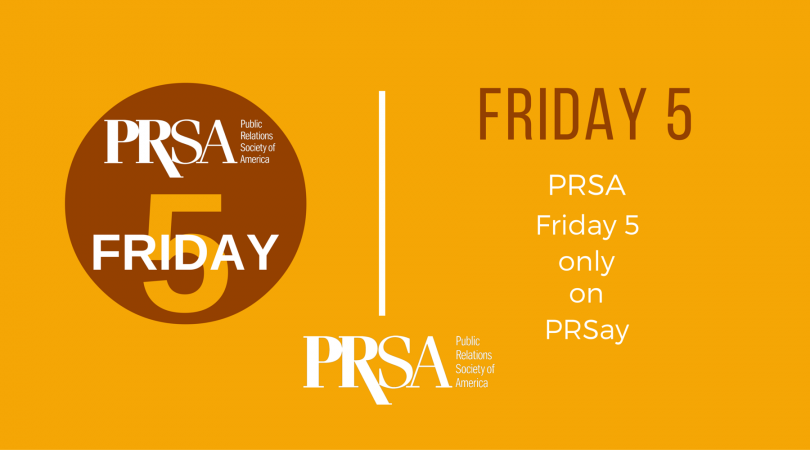It’s the industry’s worst kept secret: the employee turnover rate at public relations agencies is a massive problem. While many professionals have their own ideas as to why attrition is so high, there is one strategy that has been successful for several agencies and businesses when it comes to keeping staff happy, engaged and stationary. A solid approach seems to be developing a strong corporate culture that aligns with your employees’ personalities and workplace preferences while reflecting your brand ideals.
In this week’s Friday Five – PRSA’s take on the week’s biggest news stories – we’ll discuss the importance of a solid corporate culture and share four other lessons for PR professionals.
Here’s what we learned this week:
1. Growing Up is Hard for New Media Sites
Ah, the good ol’ days when it was blissfully fun to play and work at Gawker and Reddit. As the new kids on the block 12 and 10 years ago respectively, the two sites enjoyed an extended honeymoon period where they could get away with a free-for-all, anything goes attitude. Now that they’ve grown into media heavyweights and the primary sources of news for readers, other forces have come into play, including advertisers and traditional journalistic ethics.
Fortune’s Mathew Ingram noted in a recent article that making the switch from “anything goes” to a structured, principled entity is proving difficult for both companies. Just last week Gawker founder Nick Denton removed a story about a gay escort blackmailing a businessman when he realized that he was the brother of a politician. As the public revolted, notably anti-establishment Denton made the call to delete the article and likely saved approximately “seven figures” of advertising revenue. PR professionals should watch these sites closely during this tumultuous time, as they may emerge as ticking time bombs for clients or brands.
2. Brands Consciously Couple and Uncouple
If there’s a business need that a company cannot fulfill by itself, a partnership may be in order. Often partnerships are born out of necessity. Initially one company provides a service that the other didn’t have the capacity to fulfill, as with the initial agreement with eBay and PayPal, who “divorced” this week. In other circumstances, partnerships offer a value-add for customers and both companies, such as the recent agreement with Starbucks and the New York Times.
It is important for communication executives to note that partnerships must align with your brand to be successful. There is a natural fit between Starbucks and the Times, and both companies will benefit from the agreement. Starbucks will add value to their customer experience and give their customers a reason to truly use their mobile app, a big goal for the company. In turn, the Times will also gain exposure to select material through Starbucks as traditional media continues to look for new ways to reach target audiences. When building PR campaigns, similar couplings can often play well with your primary client. Let us know in the comments of any unique projects that you’ve worked on that took advantage of coupling.
3. Corporate Culture is Incredibly Important
What is your company’s corporate culture like? If you are having a hard time describing your company’s culture, then it isn’t likely that the culture is strong or permeating your workplace. Just this past Wednesday on PRSAY, we dedicated our monthly Ask an Expert series, PRSA’s guide to best practices straight from industry leaders, to the topic and found out the lengths industry leaders go through to retain talent by developing a strong corporate culture.
Do you want to improve your corporate culture but you don’t know where to begin? It can be as simple as creating a meaningful values statement. According to Forbes contributor Chris Cancialosi, you cannot “expect employees to rally around a set of hollow values when those ideas aren’t practiced and upheld by the leaders in your organization.” Too often values focus on what employees want to hear, rather than serve as guidelines for the company. On this summer Friday, I invite you to rethink your company culture and share ideas on how it can be improved.
4. Think Twice Before Editing Wikipedia
Wikipedia founder, Jimmy Wales, has a message for public relations firms who edit their client’s entries and shared it with watchers of HuffPost Live on Tuesday as well as any PR firms considering editing their clients’ pages: “don’t do it.” He explained his position: “There’s better ways for them to deal with Wikipedia. We’re very open. People can email us and say, ‘Oh, we’ve got this correction. We’ve got this information. Unethical PR people … think, ‘Oh, I’ll just make up a fake ID and I’ll pretend to be someone,’ and then they get caught.”
As Wales pointed out, the later situation causes negative publicity for a client or brand when the ethical way of handling it would’ve been a far simpler fix. Following a number of incidents of PR “professionals” behaving badly, the site is being vigilant and is scrutinizing edits for unethical behavior. Whether you agree with Wales’ suggestion or not, all PR agencies and practitioners should have a Wikipedia policy in place and plan to discuss the costs and potential bad PR associated with editing the page with their clients.
5. Everyone Has a Pun for Anthony Weiner
How did you celebrate National Hot Dog Day, yesterday? In my job monitoring the media for stories about the public relations industry, it was clear that yesterday was a day that was going to be entire consumed by Anthony Weiner. Weiner was hired by PR firm MWW to serve as a part-time policy advisor. My day, like many New Yorkers, started off with this headline from the always amusing and inappropriate New York Post:
Today’s cover: Anthony Weiner got a new job fixing PR messes – seriously http://t.co/syX9FGq4cl pic.twitter.com/7TF7C8jAuR
— New York Post (@nypost) July 23, 2015
My day yesterday ended with MWW clarifying Weiner’s position:
Don’t worry, Anthony Weiner won’t be “servicing clients” at his new public relations job http://t.co/1JN7kPegUU
— New York Post (@nypost) July 24, 2015
Before you invade the comments section below, all puns in this blog post were most certainly intentional. All joking aside though, this story goes to show you that no matter how bad you mess up in the public relations industry, if you know the right people there will always be a job waiting for you.
Rosanne Mottola is public relations manager at the Public Relations Society of America. You can follow her on Twitter @RoeMoPR.







